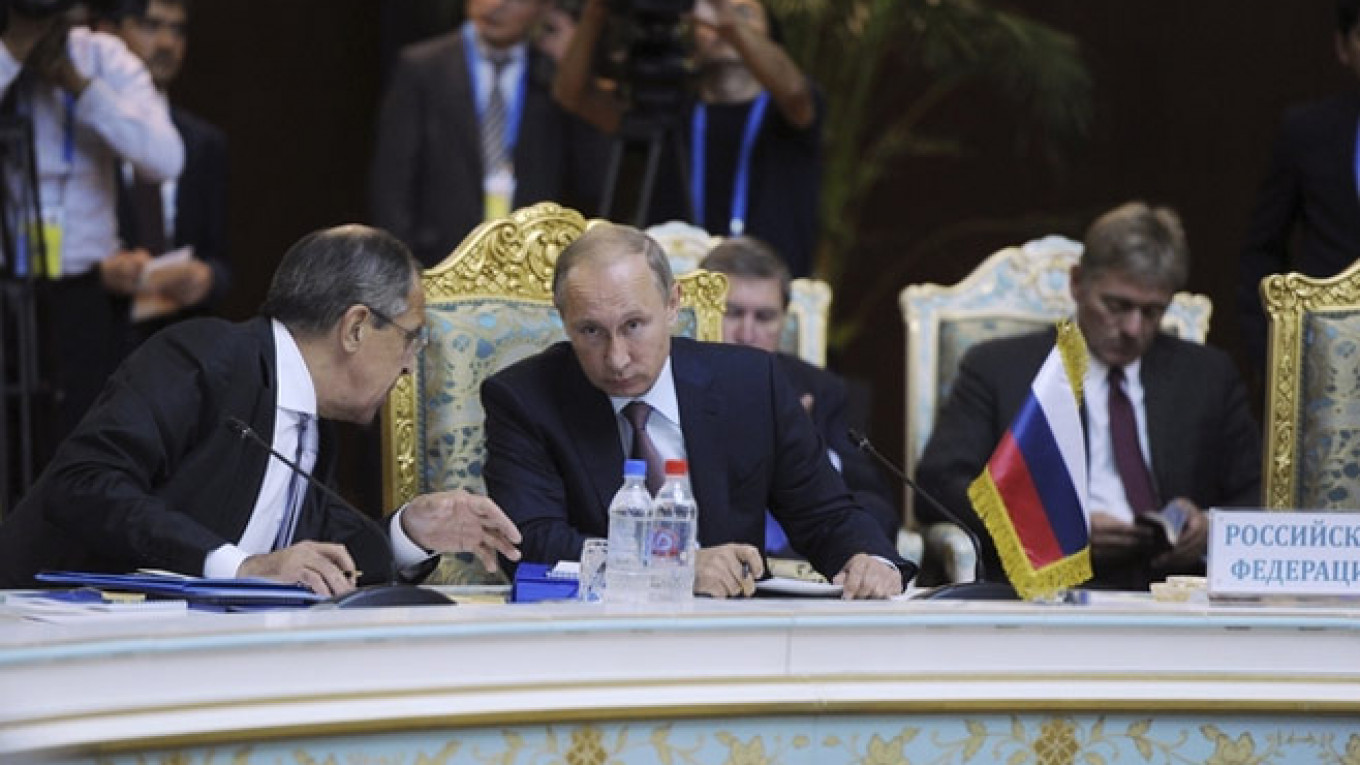During a Collective Security Treaty Organization (CSTO) meeting in Dushanbe on Sept. 15, Russian President Vladimir Putin voiced his concerns about Syria.
"The state of affairs there is very serious. The Islamic State controls significant stretches of territory in Iraq and Syria. Terrorists are already publicly stating that they have targets set on Mecca, Medina and Jerusalem. Their plans include expanding activities to Europe, Russia, Central and Southeast Asia."
Putin couldn't be more correct. The Islamic State threatens Russia and Central Asia specifically. Even though the Kremlin sees the rise of the Islamic State as the product of destructive American foreign policy and military operations that leave ungovernable holes later filled in by terrorists and transnational criminal groups, the Kremlin is intent on being a part of the solution to these problems.
Putin also blames American foreign policy for the migrant crisis currently engulfing Europe and has called for an international coalition against terrorism and extremism. The president stated that "This is a crisis which was absolutely expected. We in Russia said several years ago that there would be massive problems if our Western partners conduct what I have always called the 'wrong' foreign policy, especially in regions of the Muslim world, the Middle East and North Africa, which they continue practically to this day."
Russia is making its move in Syria, with the deployment of a forward operating base for fighter jets and drones, in support of the Syrian military. More importantly, it is possible that the Russian presence in Latakia will halt Turkish and Israeli air flights over Syria. In other words, a no-fly zone imposed by the Kremlin could emerge. Moscow has already started a humanitarian aid lift and network in the country.
Iran is part of Moscow's plans in Syria. Tehran's own military presence in Syria is working in coordination with Russia to protect the Syrian government, especially the security of Alawites in Latakia. Tehran seems to be wavering on Assad's immediate future, which fits perfectly with the Kremlin's plan. Iran may be persuaded to back Russia's plan to accommodate the Americans somewhat by helping plan an exit strategy for the Assad family.
Outlining his ideas on a potential diplomatic solution, Putin suggested that it be carried out in parallel with the fight against extremists and that Assad should play a role in the political process. Putin said that "The Syrian president, as a matter of fact, agrees with that, including holding early elections, parliamentary elections, and establishing contact with the so-called 'healthy' opposition, bringing them into governing." That argument is gaining traction in Europe and with some Arab governments.
Putin's upcoming speech at the United Nations General Assembly on Syria and the Islamic State is going to be an important marker for the Kremlin. The Kremlin wants to stabilize the Syrian government through elections endorsed by a bulk of the Syrian opposition and form a new coalition of key regional states to attack and destroy the Islamic State.
Yet, all is not rosy. The perilous state of Russia's finances will play a major role in Russia's foreign policy ambitions. With the collapse of oil prices, coupled with economic sanctions, Russia's economy will continue to be in recession.
There have also been reports that some Russian servicemen are refusing to go to Syria.
These facts do not necessarily mean that Putin's gambit with the Americans will not pay off in the future thanks to ongoing communication between U.S. Secretary of Defense Ashton Carter and Russian Defense Minister Sergei Shoigu. Nevertheless, the Kremlin sees a real need for Russia to continue its involvement in Syria, on its own terms.
Richard Galustian is a Middle East security expert based in Libya. Theodore Karasik is a senior adviser at Gulf State Analytics.
A Message from The Moscow Times:
Dear readers,
We are facing unprecedented challenges. Russia's Prosecutor General's Office has designated The Moscow Times as an "undesirable" organization, criminalizing our work and putting our staff at risk of prosecution. This follows our earlier unjust labeling as a "foreign agent."
These actions are direct attempts to silence independent journalism in Russia. The authorities claim our work "discredits the decisions of the Russian leadership." We see things differently: we strive to provide accurate, unbiased reporting on Russia.
We, the journalists of The Moscow Times, refuse to be silenced. But to continue our work, we need your help.
Your support, no matter how small, makes a world of difference. If you can, please support us monthly starting from just $2. It's quick to set up, and every contribution makes a significant impact.
By supporting The Moscow Times, you're defending open, independent journalism in the face of repression. Thank you for standing with us.
Remind me later.






